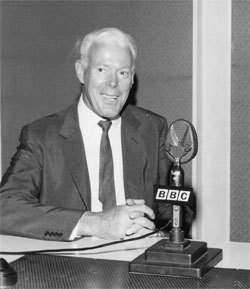Public Reading 6 February 1984
Trevor Leggett was head of the Japanese Department of the BBC.

This is one of his broadcasts to Japan
Zubari for 6 February 1984
Hello listeners!
Today I want to ask the question, what books does the public read?
Usually this question is answered by quoting the sales of books. In Britain, for instance, we can verify that new books (titles) were brought out in such and such a year, and in that year there were also re-prints of old books. Then nearly every week the newspapers publish a short list of the Top Ten sellers – ten hardback books, and ten paperback books. These lists are supposed to tell us what the public is reading.
But it can be argued that to buy a book is not the same as to read that book. For instance, in a recent list of the Top Ten hardback books, five of them were reference books, books like the standard Concise Oxford Dictionary. No one reads the Concise Oxford Dictionary. It is simply used for reference. The same applies to the Guinness Book of Records.
In Britain today, we are beginning to be able to use another method of finding out what the public is reading. The Public Library system here is very well developed. There are about 6,000 public libraries in Britain, and they are now computerized. When we borrow a book, the library assistant simply passes a ‘light pen’ over the code marks, and over our own library card, and the loan is registered.
In the first year of operation, that is, the year up to June 30, 1983, there were 649,000,000 loans. This means that on average every man woman and child in Britain borrowed twelve books from the public libraries during that year.
In that year, too, a new Government scheme came into operation. This is, a system of payment to living authors whose books are borrowed. Up till now, an author has received nothing when his books are borrowed from the Public Library, though the existence of these borrowings must mean that fewer people will buy his book. Why should anyone buy his book when it can be borrowed from the library and read without paying anything?
All authors were invited to register their names and books with the Government office, and they were told that they would receive one penny for each borrowing of each book from a library. The Government provided two million pounds for the scheme, and it was decided to limit the amount which could be earned by any one author, to five thousand pounds. An author whose books were borrowed 500,000 times would receive five hundred thousand pennies, which is five thousand pounds. If his or her books were borrowed more than that, he would still receive only the five thousand pounds.
The Government sent out invitations to all authors to apply for registration under the scheme, and 7,700 authors applied, registering. 66,850 books. Thus, the average is about nine books per author. I registered two books; most of the books I have published in Britain are translations which are not eligible to be registered. One of my books was about Judo, and the other about Zen. Altogether, these two books were borrowed 3,000 times, so I received thirty pounds.
I was interested to find out who were the authors at the top of the scale. One was Barbara Cartland, an authoress who writes popular romances widely read by women readers. The plot is a formula: a rather wild young man, of strong character, very handsome and talented, is gradually attracted into marriage by a gentle (but in fact very determined) girl. On the covers of these books, he is nearly always looking at her with passionate interest, while she is looking down, or away. The feminist movement here does not like these covers, nor the stories contained in them; but half a million women read them every year.
The best-selling writers for men are creators of spy stories and science fiction, both of them full of adventure.
There were only forty-six writers who qualified for the top bracket; they are all wealthy, and one of them announced that he will donate his five thousand pounds to a fund to help spastic writers.
I was encouraged to read in the first published analysis that a famous historian, an Oxford University professor, had earned the same as myself: thirty pounds. “His books,” said one newspaper commentator, “are above the heads of the general public. In a sense, they are too good for general popularity.”
‘Too good?’ I thought. ‘Yes. Perhaps mine are too good also!’
Well, listeners?
© Trevor Leggett
© Trevor Leggett